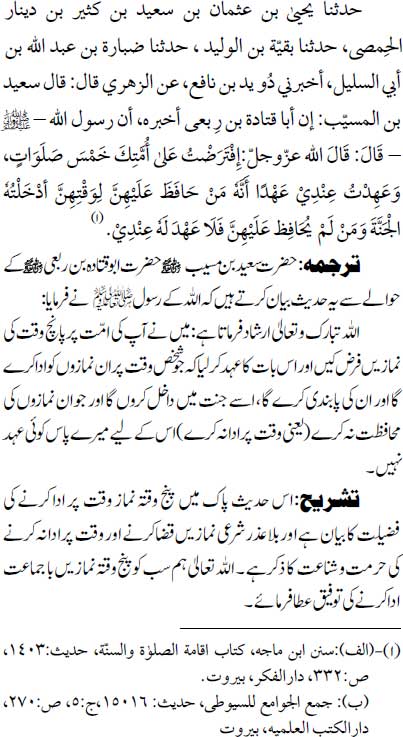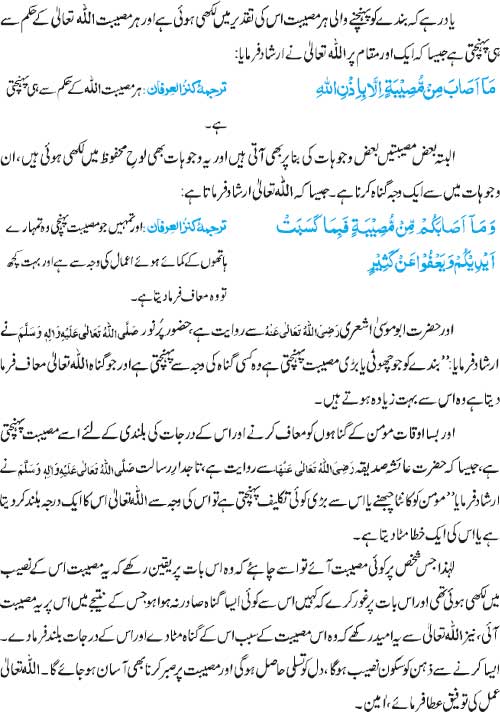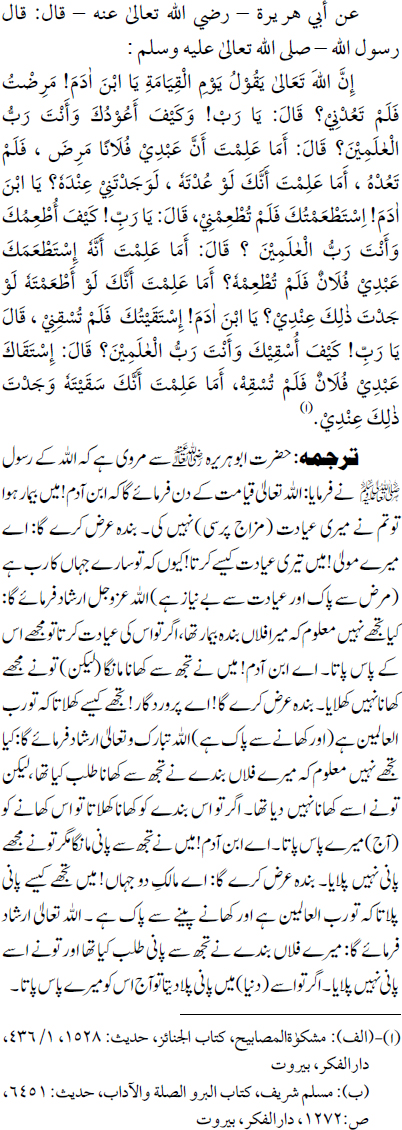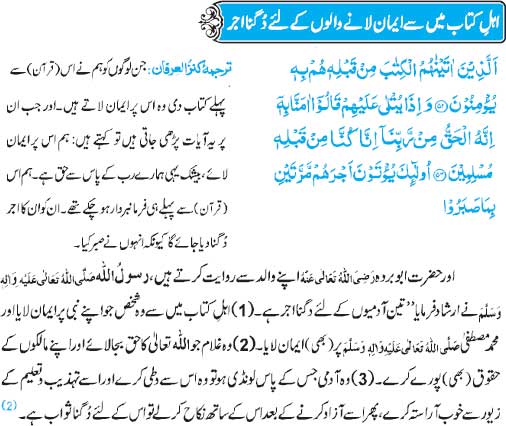
Hadith Qudsi: Waqt Par Namaz Parhne Ki Fazeelat Aur Baghair Kisi Sharai Uzar Kay Namaz Qaza Kerne Par Waeed
Recitation Prostration Rulings [Sajda-e-Tilawat]
‘Hanafi School of Thought’
The excellence of prostration during the Quranic recitation:
Abu Hurairah narrates that the Prophet sallallahu alehi wasallam said: “If a son of Adam recites an ‘ayah of prostration and prostrates, the Satan departs from him and cries: ‘O woe, he was ordered to prostrate and he did, so for him is paradise. I was ordered to prostrate and I disobeyed, so for me is the Hell.” [Ibn-e-Maaja]
1. There are fourteen places of sajdah-e-tilawat in the Quran. Wherever the word “sajdah” appears on the margin of the Quran, then on reciting that verse, sajdah becomes wajib. This sajdah is known as sajdah-e-tilaawat.
2. The method of making sajdah-e-tilaawat is as follows: the person should stand straight first then say Allahu Akbar and go into sajdah. When saying Allahu Akbar the hands should not be raised. While in sajdah, he should say: Sub-hana Rabbi-yal Aala, at least three times. Thereafter, he should say Allahu Akbar and raise his head. The sajdah-e-tilaawat is now complete.
3. It is preferable to stand up, say Allahu Akbar, and go into sajdah. And thereafter to say Allahu Akbar and stand up from the Sajdah. It is also permissible to go into sajdah and come up from it while in the sitting position without standing up at all.
4. Sajdah-e-tilawat becomes wajib on the person who recites a verse of sajdah and also on the person who hears it being recited. This is irrespective of whether the person had sat down with the intention of listening to the Quran, whether he was preoccupied with some work, or whether he heard it without intending to listen to it. It is therefore better to recite the verse of sajdah softly so that sajdah-e-tila\awat does not become wajib on anyone else.
5. Those factors that are a prerequisite for salaat are also prerequisites for sajdah-e-tilawat. That is, the person must be in a state of wudu, the place must be clean, the body and clothing must be pure, sajdah must be made in the direction of the qiblah, etc.
6. Sajdah-e-tilawat should be made in the same way as sajdah is made in salaat. Some people make their sajdah on the Quran itself. Sajdah in this manner is not valid and one is not absolved from this wajib.
7. If a person does not have wudu at that time, he could make wudu at a later stage and then make the sajdah. It is not necessary to make sajdah immediately. However, it is better to make it immediately because it is possible that the person might forget later.
8. If a person has several sajdah-e-tilawats to make and has not made them till now, he should make them now. He should make them at some time or other in his life. If he does not do so he will be sinning.
9. If a woman hears a verse of sajdah while she is in her haid or nifaas, sajdah-e-tilawat is not wajib on her. But if she hears it when she is in a state when ghusl was wajib on her, it will be wajib on her to make sajdah-e-tilawat after having a bath.
10. If a person hears the verse while he is very ill and does not have the strength to make sajdah, he should make sajdah-e-tilawat just as he makes the sajdah of salaat through gestures.
11. If a person recites a verse of sajdah while he is in salaat, then upon reciting the verse he should immediately go into sajdah, thereafter continue with the rest of the Surah, and then go into ruku. If a person does not go immediately into sajdah but goes into sajdah after reciting two or three more verses, this sajdah will still be proper. And if he recites several more verses and then goes into sajdah, the sajdah will be proper but he will be sinning.
12. If he recites a verse of sajdah while in salaat but does not make sajdah in the salaat, the sajdah will not be valid if he makes it out of salaat. He will remain a sinner forever. Now there is no way of absolving himself except through repentance and seeking forgiveness.
13. If a person recites a verse of sajdah and immediately thereafter goes into ruku and makes this intention that he is making this ruku for the sajdah-e-tilawat as well, even then the sajdah will be considered to be valid. If he did not make this intention in his ruku, the sajdahs that he makes after the ruku will also suffice for the sajdah-e-tilawat. This is irrespective of whether he makes any intention or not.
14. While in salaat, a person hears a verse of sajdah being recited by someone else. He should not make sajdah-e-tilaawat in his salaat but after completing his salaat. If he makes it in his salaat it will not be valid. He will have to repeat it, and he will also be committing a sin.
15. A person was sitting in one place and reciting the same verse of sajdah several times- only one sajdah-e-tilawat will be wajib. He could either recite that verse as many times as he wishes and then make one sajdah right at the end, or he could recite that verse once, make one sajdah and then recite that verse as many times as he wishes. But if he changes his place, and then repeats that verse, then goes to a third place and recites that same verse, and in this way, he continues changing places and also continues reciting that same verse – then for every time that he repeats that verse he will have to make sajdah for it.
16. If a person sits at one place and recites several verses of sajdah, he will have to make sajdah-e-tilawat for every verse of Sajdah.
17. While sitting down, a person recited a verse of Sajdah. He then stood up but did not move from that place of sitting, i.e. he stood on the same spot where he had been sitting. He then repeated that same verse – he will only have to make one sajdah-e-tilawat.
18. He recited a verse of sajdah at one place, got up and went to do some work, came back and sat at that same spot, and recited that same verse again. He will have to make two sajdahs.
19. While sitting in one place he recited a verse of sajdah. On completing the recitation of the Quran, he remained sitting in that place and started doing some other work. For example, he started eating, or a woman started sewing or feeding her child. Thereafter he (or she) recited that same verse of sajdah again. Even then, two sajdahs will have to be made. When a person engages in any other task, it will be regarded as if the place has changed.
20. A person recited a verse of sajdah in one corner of a small room or verandah. He then went and recited the same verse in another corner – even then only one sajdah will suffice irrespective of how many times he recited that verse. However, if he commences with some other work and then recites that verse again, he will have to make another sajdah. And if he occupies himself with a third type of work, a third sajdah will become wajib.
21. If it is a big house, then by repeating the verse in another corner, he will have to make another sajdah. And if he repeats it in a third corner, he will have to make a third sajdah.
22. The rule that applies to a small room also applies to a musjid. That is, if he repeats the same verse of sajdah several times, only one sajdah will be wajib irrespective of whether he recites it while sitting down in one place or he recites it while walking about in the musjid.
23. If a person recites the same verse of sajdah several times in one salaat, even then he will only have to make one sajdah. If he wishes, he could recite it as many times as he wishes and thereafter make one sajdah, or he could recite it once, make one sajdah and thereafter recite it as many times as he wishes in that same rakaat or even in the next rakaat.
24. A person recited a verse of sajdah but did not make sajdah-e-tilawat. Thereafter, he stood up at that very spot, commenced offering salaat, and recited that very verse in his salaat and also made sajdah-e-tilawat in his salaat. This sajdah which he made will be sufficient for both the recitations. However, if he changed his place, it would be wajib to make two sajdahs.
25. He recited a verse of sajdah and also made sajdah-e-tilawat. Thereafter, he stood up, commenced offering a salaat, and recited that same verse in his salaat. Now he will have to make a sajdah again in salaat.
26. The person who was reciting did not change his place. He recited the same verse of sajdah several times. However, the place of the person who was listening changed: he heard the verse in one place for the first time, then heard it in another place a second time, and in another place a third time. Only one sajdah-e-tilawat will be wajib on the person who was reciting. But the person who was listening will have to make a sajdah for every time that he hears it.
27. If the place of the person who was listening did not change but the place of the person who was reciting changed, then several sajdahs will become wajib on the person who was reciting while the person who was listening will have to make only one sajdah.
28. It is makruh to recite the entire Surah and leave out the verse of Sajdah. That verse should not be left out merely to save oneself from making sajdah. In doing so, it will be regarded as if the person is rejecting that verse.
29. There is no harm in reciting the verse of sajdah only and leaving out the entire surah. If this is done in salaat, an additional condition is that this one verse must be such that it equals three short verses. However, it is better to recite a few verses together with the verse of Sajdah.
30. If a person hears an imam reciting a verse of sajdah and he joins the jamaat thereafter, he should make the sajdah-e-tilawat with the imam. But if the imam has already made the sajdah, there are two conditions for this: (1) If he gets that rakaat in which he heard the imam reciting the verse, he will not have to make a sajdah. By getting that rakaat, it will be regarded as if he got that sajdah as well. (2) He did not get that rakaat. After completing his salaat, it will be wajib on him to make that sajdah out of salaat.
31. If a verse of sajdah is heard from the muqtadi, sajdah-e-tilawat will not have to be made – not by him, not by the imam, nor by those who are with the muqtadi in that very salaat. However, sajdah-e-tilawat will be wajib on those who are not with them in that salaat. This is irrespective of whether they heard it while they were out of salaat or whether they were offering some other salaat.
32. By laughing aloud in sajdah-e-tilawat (which is offered out of salaat), one’s wudu does not break. However, the sajdah-e-tilawat itself becomes invalid.
33. If a woman stands in line with a man, the sajdah-e-tilawat will not become invalid.
34. When sajdah-e-tilaaat becomes wajib in salaat, it is wajib to make that sajdah immediately. It is not permissible to delay it.
35. Sajdah-e-tilawat which became wajib out of salaat cannot be made in salaat. Similarly, if it becomes wajib in salaat, it cannot be made out of salaat. In fact, it cannot even be made in another salaat. If a person recites a verse of sajdah in salaat and does not make sajdah-e-tilawat in salaat, the sin for that will rest on his shoulders. He can do nothing except make taubah and ask Allah Ta’ala to forgive him through His bounty.
36. If two people are traveling separately on horseback and both of them are offering salaat while the horses are moving. And each one of them recites the same verse of sajdah and both of them hear each other’s recitation, one sajdah-e-tilawat will be wajib on each of them. It will be wajib to make that sajdah in their salaat. If they recited the same verse in salaat and thereafter recited it again out of salaat, it would be wajib to make two sajdah. One because of recitation and the other because of listening. However, the one that is because of recitation will be considered to be in salaat and will therefore have to be made in salaat. And the one that is because of listening will be made out of salaat.
37. The verses of sajdah should not be recited in the jumu’ah salaat, eid salaats, and in those salaats which are offered silently. This is because there is a fear of putting the muqtadis into doubt.
Museebat Ki Waja

Museebat Ki Waja
Greatest Rewards In Spending
[17. Surah Al-Israa: Ayah 26] And give to the near of kin his due and (to) the needy and the wayfarer, and do not squander wastefully.
[17. Surah Al-Israa: Ayah 27] Surely the squanderers are the fellows of the Shaitans and the Shaitan is ever ungrateful to his Lord.
[Sahih Muslim: Book 5 Kitab Al-Zakat, Number 2180] Thauban (Radi Allah Anhu) reported Allah’s Messenger (sal-allahu-alleihi-wasallam) as saying: The most excellent dinar is one that a person spends on his family, and the dinar which he spends on his animal in Allah’s path, and the dinar he spends on his companions in Allah’s path. Abu Qilaba (one of the narrators) said: He (the narrator) started with family.
And then Abu Qilaba said: Who is the person with a greater reward than a person who spends on young members of his family (and thus) preserves (saves them from want) (and by virtue of which) Allah brings profit for them and makes them rich.
[Sahih Muslim: Book 5 Kitab Al-Zakat, Number 2181] Abu Huraira (Radi Allah Anhu) reported Allah’s Messenger (sal-allahu-alleihi-wasallam) as saying: Of the dinar you spend as a contribution in Allah’s path, or to set free a slave, or as a sadaqah given to a needy, or to support your family, the one yielding the greatest reward is that which you spent on your family.
[Sahih Muslim: Book 5 Kitab Al-Zakat, Number 2182] Khaithama (Radi Allah Anhu) reported: While we were sitting in the company of ‘Abdullah bin. ‘Umar there came in his steward. He (Ibn ‘Umar (Radi Allah Anhu)) said: Have you supplied the provision to the slaves? He said: No. Upon this, he said: Go and give (the provision) to them, for the Messenger of Allah (sal-allahu-alleihi-wasallam) has said: This sin is enough for a man that he withholds the subsistence from one whose master he is.
Hifazat e Iman Ka Bara Inaam

Hifazat e Iman Ka Bara Inaam
Al-Muntaqim: The Retaliator
Then when they had provoked our wrath, we inflicted our retribution on them and drowned every one of them. ( Surat Az- Zukhruf, 43:55)
Allah warns every nation through his chosen messengers so that they might be saved from idolatry and degeneration. As for those who ignore these warnings and grow more insolent, Allah punishes them. and, his retribution is surely unlike that of people:
Those who did not Believe will be Addressed: “Allah’s Abhorrence of you, when you were called to faith but then chose unbelief, is even greater than your hatred of yourselves.” ( Surat al-Ghafir, 40:10)
In most cases, Allah may delay His punishment upon those people who were warned, and thus were informed of the truth, to give them more time to acquire faith and purify themselves. However, the majority of people use this time to strengthen their existing insolence. Therefore, they deserve a humiliating punishment. As Allah states:
It is coming closer to you and closer. Then closer to you and closer still. Does man reckon that he will be left to go on unchecked? ( Surat al-Qiyama, 75:34-36)
According to the Qur’an, denying our Lord, being insolent and ungrateful toward Him, and refusing to abandon such defiant attitudes are among the greatest crimes a person can commit. This is why Allah punishes unbelievers in ways that they could never have imagined. In one verse, Allah informs us that He is the Retaliator:
On the day We launch the Great Assault, We will certainly inflict Our retribution. ( Surat ad-Dukhan, 44:16)
This aside, many verses speak of Allah’s infinite compassion and the manifestations of His attributes of al-Rahman and al-Raheem. The punishments waiting for unbelievers in the Hereafter are the result of their resolute unbelief. Allah reminds people of this fact and informs them that He does not wrong them, as follows:
[ Angels will say to unbelievers: ] “That is for what you did. Allah does not wrong His servants.” ( Surat al-Anfal, 8:51)
Allah would not punish them while you were among them. Allah would not punish them as long as they sought forgiveness. ( Surat al-Anfal, 8:33)
These are Allah’s Signs, which We recite to you with the truth. Allah desires no wrong for any being. (Surah Al ‘Imran, 3:108)
Our Lord, Who is Most Merciful, also relates that He intends to lead all of His servants to the right path and to perfect His blessings upon them, as follows:
Allah desires to make things clear to you, to guide you to the correct practices of those before you, and to turn toward you. Allah is All-Knowing, All-Wise. ( Surat an-Nisa’, 4:26)
Allah does not want to make things difficult for you; rather, … He wants to purify you and perfect His blessing upon you so that hopefully you will be thankful. ( Surat al-Ma’ida, 5:6)
Hadith Qudsi: Mizaj Pursi

Hadith Qudsi: Mizaj Pursi (Mareez Ki Ayadat)
Good Life OF The Hereafter
[Allah’s Quran – 33:28-29] “O PROPHET! Say unto thy wives: “If you desire [but] the life of this world and its charms – well, then, I shall provide for you and release you in a becoming manner; but if you desire God and His Apostle, and [thus the good of] the life in the hereafter, then [know that], verily, for the doers of good among you God has readied a mighty reward!”
The Prophet (peace be upon him) has said:
[Muslim, Book #009, Hadith #3498] “’A’isha (Allah be pleased with her) reported: When the Messenger of Allah (may peace be upon him) was commanded to give an option to his wives, he started it from me saying: I am going to mention to you a matter which you should not (decide) in haste until you have consulted your parents. She said that he already knew that my parents would never allow me to seek separation from him She said: Then he said: Allah, the Exalted and Glorious, said: Prophet, say to thy wives: If you desire this world’s life and its adornment, then come, I will give you a provision and allow you to depart a goodly departing; and if you desire Allah and His Messenger and the abode of the Hereafter, then Allah has prepared for the doers of good among you a great reward She is reported to have said: About what should I consult my parents, for I desire Allah and His Messenger and the abode of the Hereafter? She (‘A’isha) said: Then all the wives of Allah’s Messenger (may peace be upon him) did as I had done.”
Ahle Kitab Mein Say Iman Laanay Walon Kay Liay Dugna Ajar

Ahle Kitab Mein Say Iman Laanay Walon Kay Liay Dugna Ajar
Allah Is In Every Breath
When things are down, and you are out of your mind, just remember, Allah (SWT) is the All-Kind.
When your life is in darkness, and nothing is right, remember, through the darkness, Allah (SWT) is the Light.
When nothing makes sense, and you heading for demise, just remember, it doesn’t make sense but, Allah (SWT) is the All-Wise.
When times are troubled, and no one seems to care, just remember, Allah (SWT) won’t hurt you, He is Just.
When your heart is breaking, and your pain makes you fall, just remember, Allah (SWT) sees all.
When you are weak, and the road seems long, just remember; seek strength from the All-Strong.
When life is a burden, and everything is unstable, just remember, Allah (SWT) is Able to do all.
When the way is cloudy and no one is by your side, just remember, Allah (SWT) is the Only Guide.
When no one wants to listen or is willing to lend an ear, just remember, Allah (SWT) is the All-Hearing.
When you are poor and penniless, and you are stuck in a niche, just remember, Allah (SWT) is the Rich.
When you are down in your misery, and there is nowhere to run, just remember, you can always run to the One.
When you’re all alone, and your pain has no end, just remember, Allah (SWT) is the only one you can depend on.
And when your scars are hurting, and your heart is in fear, just remember, Allah (SWT) is with those who are patient.

